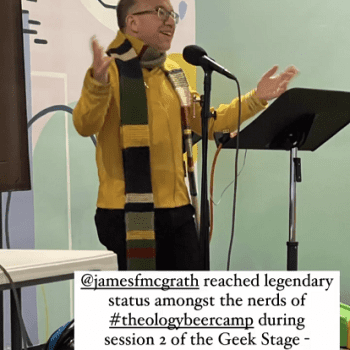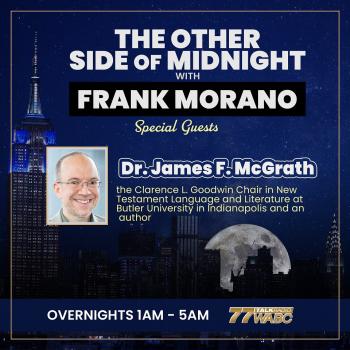I had an e-mail from a reader of the blog a while back, and it has taken me much longer than I had hoped to begin answering the questions that I was asked. Here is one of them, which seems timely:
[W]hile I understand that you are sceptical of the prospect of an afterlife, I wonder what your opinion would be on the possibility of a physical resurrection, and could that be something that a Christian could responsibly hope for, if not expect. Tying into this, I know, as you’ve asserted multiple times on your blog that we cannot expect to prove the Resurrection happened historically, but would you say there is still room to hope for the possibility that it happened?
I think this is a great question, for a number of reasons. It is a topic I address in my book The Burial of Jesus (which I tend to mention on the Saturday between Good Friday and Easter most years, because of the title, even though the book is as much about the rise of belief in Jesus’ resurrection as about the actual burial of Jesus).
The short answer is that it is not at all inappropriate to hope. On the one hand, I would say that, if the afterlife were indeed supposed to be the focus of human existence, then we ought to expect more and clearer revelations and explanations on that topic than we have received. Instead, the idea appears late in the Jewish Scriptures. And so I think we ought to be focused on these matters less than we are.
But on the other hand, to the extent that the future – whether for us personally, for our species, or for anything at all – is a context that has the potential to give meaning to our present existence, or deprive us of it, I would emphasize the need to not put the cart before the horse. Belief that there is an afterlife arose in the Biblical context not as a response to proof, but as an expression of the conviction that the supreme God is so concerned with justice, and so powerful, that not even death will prevent God from doing what is right. There is no reason that those who view God in this way cannot maintain the same conviction about an afterlife. And, conversely, no one should resent the fact that they need to do so merely on the same basis that people first developed and subsequently held to the viewpoint.
For those who may be interested, I explore some of these matters related to the theology of an afterlife in my forthcoming book Theology and Science Fiction, about which you’ll be hearing more here in the coming months.
As for the question of what may have led the earliest Christians to the convictions they had specifically about the resurrection of Jesus, let me provide a long excerpt from my book, which you can buy for a mere $2.99 if you’d like to read more of my thoughts on the matter.
One can only speculate about what the first post-Easter experience of “seeing Jesus” may have been like. It is alluded to, but ultimately left undescribed, in 1 Corinthians 15:5, where Paul writes simply that he “appeared to Peter.” The challenge to the historian is to reconstruct a plausible scenario that could have given rise to the evidence available in later sources. Perhaps, as we have suggested above, Peter returned to Galilee and to fishing. He wrestled with the failure of his expectations, with his own failure in denying Jesus, and perhaps with questions about whether things might have turned out differently had no one drawn a sword and cut off the ear of the high priest’s servant that fateful night (Mk. 14:47). On one particular day he goes fishing, taking some of Jesus’ other closest followers with him. They catch nothing, and much of the time is spent in silence. Then, they see a figure on the shore. The figure asks if they have caught anything, and they say no. He tells them to try again, and suggests a spot. They lower their net –and catch a huge number of fish. Peter makes a connection. Isn’t this the spot where he first met Jesus, who did something similar on that occasion? He looks up. Perhaps the figure on the shore has already vanished. Perhaps he is still standing there, and they have breakfast without exchanging many words, as suggested in John 21. In either case, at some point after the figure has departed, Peter suddenly has a flash of insight: it was Jesus. He tells the others, but at least initially, they are skeptical, and for a time they remain unpersuaded.
Peter spends much of the days that follow in prayer, seeking information and advice from rabbis and experts in the Law. What do the Scriptures in fact say about what the Messiah would be like? Could the Messiah suffer? Could the Messiah return from the dead? Could the Messiah enter the messianic age of the resurrection ahead of everyone else? Were there passages that left open such possibilities, texts that had been neglected but which might allow for such an unthinkable, paradoxical, surprising Messiah? After much reflection, exploration, and soulsearching, Peter contacts the rest of the Twelve, and they gather to hear what Peter has to say.They listen, and when he is done explaining to them what he has come to believe, he leads them in the prayer Jesus had taught them. “Father…” they begin. When they reach the words “Your will be done,” they mean it as they had never truly meant it before. “Not our will, but yours.” A sense of peace washes over them. A sense of certainty that Peter is right, that Jesus has in fact been raised. And in their dreams, and in glimpses in crowds, in mysterious encounters with unknown individuals, and even in mystical visions, they too experience this phenomenon of“Jesus appearing.”
Could this be the way events unfolded, and Christian faith in the resurrection of Jesus arose? What we have written in this section is admittedly speculative. There seems to be little hope of gaining access by means of the extant written sources to the actual experiences that early Christians had, the ones that convinced them Jesus was alive. Even Paul only alludes to his own direction-changing experience, and never describes it. Perhaps this is appropriate: religious experiences are regularly characterized by those who have them as ineffable, as “beyond words.”The Gospel of Mark suggested that Jesus would be seen, but doesn’t describe the experience, at least not in our earliest manuscripts. Our two earliest sources thus leave little for us to work with at this point.
But this much can be said: the act of completely surrendering has transformed many lives. Such unconditional surrender to God seems to have been central to Jesus’ own spirituality. There would be something fundamentally appropriate if it turned out to be central to the rise of the conviction in the earliest disciples that Jesus had been raised, as it has been for Christians all through the ages since then. But even if we choose to speculate about the nature of these early Easter experiences, the truth is that, in the end, we do not have access to them. Those who have religious experiences often find words fail them. If we choose to fill the silence of our earliest sources with speculation, it should be speculation that respects the fact that those who have had religious experiences regularly acknowledge that, in the end, they defy description.
And one more brief snippet that addresses a concern some may have in relation to the longer excerpt above (although the comment is made primarily in connection with other possibilities):
Some readers who know the New Testament well will probably be reluctant to accept the claims made in this section. Speaking of the disciples’ experiences of “seeing Jesus” as dreams and visions does not fit with some of the stories in the Gospels, in which Jesus even eats with people and was perhaps touched by them. However, it is important to observe that all such details which emphasize the physicality of Jesus’ resurrection body are in the latest of the New Testament Gospels: Luke and John. The earlier Gospels do not specify that Jesus’ resurrection body had this physical, material character, and our earliest Gospel, in its earliest form that we have access to,does not describe Jesus appearing at all.
I hope you found these excerpts from The Burial of Jesus: What Does History Have to Do With Faith? interesting enough that it makes you want to read more!













